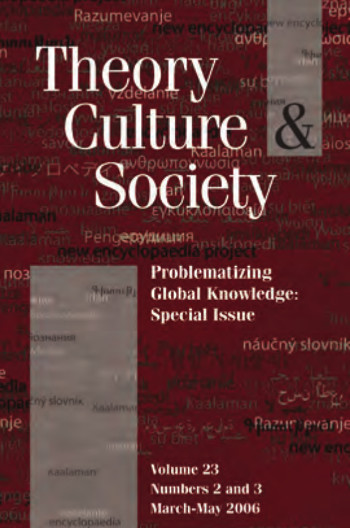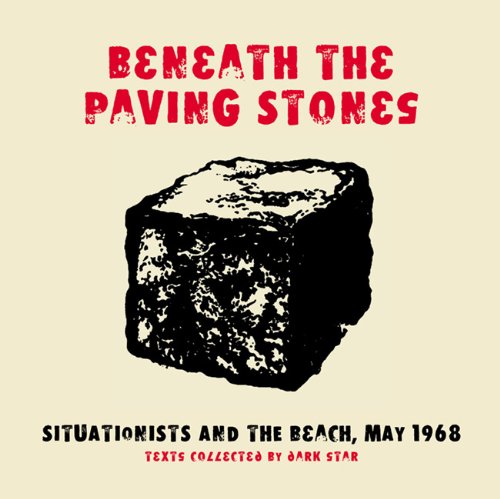Theory, Culture & Society 23(2-3): Problematizing Global Knowledge (2006)
Filed under book, journal | Tags: · aesthetics, archive, assemblage, body, classification, culture, encyclopedia, globalisation, information, knowledge, knowledge production, language, library, life, logic, media, modernity, network, public sphere, race, religion, science, space, technology, theory, time, translation, university, vitalism

In this special issue the TCS editorial board, along with colleagues in East and South-East Asia and other parts of the world, ventured in ‘encyclopaedic explorations’ in order to “rethink knowledge under the impact of globalization and digitization. The issue features over 150 entries and supplements on a range of topics which are addressed in terms of their relevance to knowledge formation, by contributors writing from a wide range of perspectives and different parts of the world. The entries and supplements are gathered under three main headings: metaconcepts, metanarratives and sites and institutions.”
Edited by Mike Featherstone, Couze Venn, Ryan Bishop and John Phillips, with Pal Ahluwalia, Roy Boyne, Beng Huat Chua, John Hutnyk, Scott Lash, Maria Esther Maciel, George Marcus, Aihwa Ong, Roland Robertson, Bryan Turner, Shiv Visvanathan, Shunya Yoshimi
With an Introduction by Mike Featherstone and Couze Venn
Publisher Sage, 2006
616 pages
Sophia Roosth: Crafting Life: A Sensory Ethnography of Fabricated Biologies (2010)
Filed under thesis | Tags: · anthropology, bioengineering, biology, diy biology, fabrication, gastronomy, life, sensory ethnography
“This ethnography tracks a diverse set of practices I term ‘constructive biologies,’ by which I mean efforts in the post-genomic life sciences to understand how biology works by making new biological things. I examine five fields of constructive biology – synthetic biology, DIY biology, hyperbolic crochet, sonocytology, and molecular gastronomy – investigating how they are enmeshed in sensory engagements that employ craftwork as a means of grasping biology.
Synthetic biology is a community of bioengineers who aim to fabricate standardized biological systems using genetic components and manufacturing principles borrowed from engineering. DIY biology is a community of “biohackers” who appropriate synthetic biologists’ terminologies, standards, and commitment to freely exchanging biomaterials in order to do hobbyist biological engineering in their homes. The Hyperbolic Crochet Coral Reef is a distributed venture of thousands of women who are cooperatively fabricating a series of yarn and plastic coral reefs in order to build a material simulation of oceanic morphologies and evolutionary theories. Sonocytology, a technique in nanotechnology research, uses scanning probe microscopes to “listen to” cellular vibrations and “feel” the topologies of cells and cellular components. Molecular gastronomy is a movement in which practitioners – physical chemists and biochemists who study food, and chefs who apply their results – use biochemical principles and laboratory apparatuses to further cooking and the culinary arts.
In analyzing these fields, I draw on histories of experimental biology, anthropological accounts of artisanship, science studies work on embodiment and tacit knowledge in scientific practice, and sensory ethnography. Based on data gathered from participant-observation and interviewing, I argue for thinking about making new biological things as a form of ‘crafting,’ an analytic that illuminates five aspects of contemporary biological manufacture: 1) sensory cultivation, 2) ongoing participation with biological media and forms, 3) the integration of making biological things and practitioners’ selfmaking, 4) the embedding of social relations, interests, norms, and modes of exchange in built artifacts, and 5) the combination of making and knowing. In this study, I argue that both biology the substance and biology the discipline are currently being remade, and that increasingly, life scientists apprehend ‘life’ through its manufacture.”
Dissertation thesis
Supervisor: Stefan Helmreich
Publisher Massachussetts Institute of Technology, September 2010
326 pages
PDF (24 MB)
Comment (0)Beneath the Paving Stones: Situationists and the Beach, May 1968 (2001)
Filed under book | Tags: · 1968, everyday, life, protest, situationists, social movements, spectacle

“This anthology comprises 3 pamphlets—The Poverty of Student Life; Totality for Kids; and The Decline and Fall of the Spectacular Commodity Economy plus eyewitness accounts of the Paris May ’68 events. Much of the Situationist creed was produced in pamphlet form and these three were crucial in creating the Situationist legend. They provide both an introduction to the ideas of the Situs and a provocatively seductive invitation to a life of freedom & revolt which prefigues many of the themes of today’s mass protestors. Illustrated throughout with photos of the May ’68 events and the graffiti that played such a famous role. The 7″ x 7″ size replicates size of the Parisian cobblestones used by the protestors.”
Collected by Dark Star
Publisher AK Press, Edinburgh and San Francisco / Dark Star, 2001
ISBN 1902593383, 9781902593388
120 pages
Review: Charlie Bertsch (Bad Subjects 2001).
PDF (6 MB)
Comment (0)
